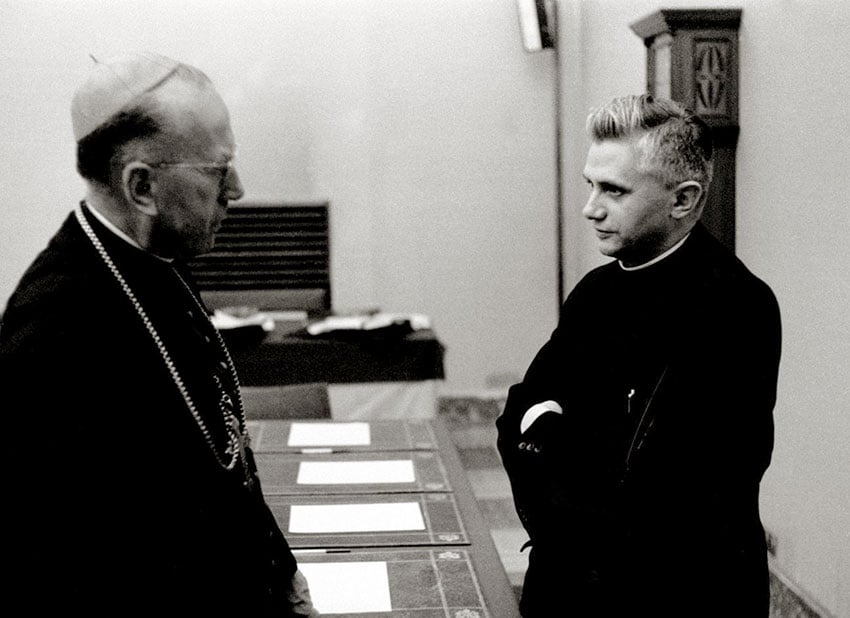
When I learned of the death of Pope Benedict XVI on the eve of the new year, I prayed in thanks for the life and vocation of Joseph Ratzinger who devoted his life to service of the Church, as priest, teacher, guardian of the faith and pope. I was also hopeful that this historic moment might open many Catholics and others beside who may never had the opportunity to read or study Ratzinger’s works, interviews and essays to become more familiar with his thought and contributions, not only as the bishop of Rome but as one of the finest theologians of the Catholic faith.
One of the gifts of Joseph Ratzinger, the theologian and shepherd-teacher, for which I will ever give thanks is the way in which he enlarged our sense of the Church’s mystery, as Christ’s body and communion in history, through his familiarity with tradition and by his voluminous output.
As a scholar, Ratzinger brought to his reflections on the Church a remarkable sense of faith, knowledge of patristic thought and a concern for contemporary culture. As we reflect on his life and legacy, there are some basic ideas of his which stand out as helps and encouragements for living faith today in the community of the Church. These ideas might encourage further reading and exploration of his thought for those not familiar with it.
A challenging gift
In his close study of St Augustine, Ratzinger recognised the Church as marked by ‘the painful littleness of humanity’ but all the same a gift and mercy for us rather than a burden. This is because, like Augustine, our conversion to God cannot be sustained without help beyond our self. God offers and bestows grace in the Church as a necessary help to lead us ever more towards Him.
A communion that overcomes all divisions
In his writings on the meaning of Christian community, Ratzinger locates our union as Christians in the life of Christ and in the common fatherhood of God. As a result, the foundation of the Church and its ecclesial bond can only be faith in Christ sent by the Father. This ’catholic’ or universal faith, rather than generating a closed esoteric circle, overcomes all-too-human divisions, including those of nationalism, class and other barriers of the age. This is because it is a faith that concretely expresses itself not in elitism but in mission, charity and suffering with others in love. By these ways, the communion of the Church does not become an abstract idea but really becomes present in human history in a people, united by and journeying with the Lord.
Where the visible and invisible meet
In the Eucharist, the body of Christ, Ratzinger locates another key that unlocks the mystery of the Church, Christ’s body. Like the Eucharist, the Church is the meeting point of the visible and invisible, the spiritual and material, history and grace. What is more, the Church is the meeting place between the vertical – the risen body and blood of Christ – and the horizontal in the gathering of the followers of Christ. So, it is the Eucharist that sets apart this People of God as those of the new covenant, a covenant in which Christ’s body is the new temple ‘not built by human hands’ (Acts 17:24). It is this Eucharist which then ‘makes’ or realises the Church as a community of the faithful by its reception. This Eucharistic and deeply sacramental ecclesiology was reclaimed from tradition by Ratzinger alongside other contributors to the Second Vatican Council, including French Jesuit Henri de Lubac and the future John Paul II himself.
New evangelisation: the Church and the world
Last but not least, in his treatment of the Church in its relationship to the world, Ratzinger evinced a commitment to mission and dialogue with the world that encourages us in Christian discipleship. It is a theme that would carry over into focus as pope on a ‘new evangelisation’, a project first set out by his predecessor John Paul II. Whether in the form of a disinterested serving love that may see slight response or in that fervent proclamation of God’s gift of self in Christ which marks the New Testament witness, the Gospel was for Ratzinger a gift not to be anxiously ‘clutched’ by the Church if it was to be faithful to its own meaning, but rather carried far and wide to the rest of humanity with courageous love and faithful witness. In this encouragement to the Church, Ratzinger had fundamental confidence in the Word, that it was Christ who could illuminate our deepest questions and desires as people created in and for God. This strong faith grounded his willingness to dialogue with atheism, agnosticism and other faiths and philosophies, confident that in the search for truth that the face of God could be encountered and had been revealed in the Lord Jesus.
This Eucharistic and deeply sacramental ecclesiology was reclaimed from tradition by Ratzinger alongside other contributors to the Second Vatican Council, including French Jesuit Henri de Lubac and the future John Paul II himself.
Like the Church Fathers he long mined and reclaimed for inspiration, the theological insights of Joseph Ratzinger for the Church are profound, much richer than can be conveyed here. I am confident that his works will be the subject of study and a resource of faith for generations to come. Chief among his legacies is a call to grow in the heart of the Church, a Church which he loved and served so faithfully throughout his life and that now remembers him as one of its finest sons.
Related
